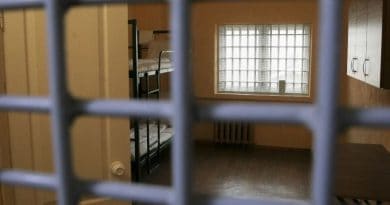Uzbekistan: prisoner dies after brutal torture
The leader of the human rights organization “Ezgulik” Abdurakhman Tashanov posted a post and video of the mutilated body on a social network. On July 1, he wrote about Farrukh Khidirov, who died on June 27 in Tashkent penal colony (colloquially Sangorod). He was brought to a medical special institution from colony No. 11(Navoiy region), where the prisoner was beaten and burned with boiling-hot water. For eight days, doctors unsuccessfully tried to save Farrukh’s life.
According to the human rights activist, “a few days before his death, Farrukh Khidirov called home and said that the colony workers were demanding money from him and even provided bank account details to which they asked to transfer funds.” Having not received the desired, the colony officers began to torture him. As a result, numerous hematomas appeared on the body, and also, because of boiling-hot water, the area from the neck to the lower back became red.
Main Directorate of Corrections of the Ministry of Internal Affairs instantly published a refutation in Uzbek online media. The message stated that Farrukh is a recidivist referring to the list of articles of the Criminal Code for which he was serving his sentence. A list of diseases was also a part of that message: tuberculosis, diarrhea, prolonged fever of unknown etiology. The post along with the video was deleted due to the social network policy. Right after this happened the trolls from the support team of the Ministry of Internal Affairs began to refute the fact of torture in social networks.
“The body was examined by the prosecutor’s office, no bodily injuries were detected, and an appropriate examination was appointed regarding the incident. The redness that appeared on the video is a cadaveric stain and has nothing to do with bodily harm”, the statement said.
According to an ACCA expert, one does not need to be a specialist in forensic medicine to understand the nonsense about one cadaveric spot on the entire back and its color. “The officials from the prosecutors issued such a conclusion because of the powerlessness to refute the most severe torture,” the expert said. – After all, the helpless prisoner was beaten heavily and abundantly doused with boiling water. The Ministry of Internal Affairs quickly made up fake facts, trying to justify its employees and drown out the media noise. Contradictions in the opus of Uzbek law enforcement officers should alert readers”.
The argument for this statement is the cautious citation of the Main Department of Corrections message by the local press. At the same time, the news agency Kun.uz was bolder, it reported a paragraph from a statement while ignored by other media. “On June 15, the defunct was sitting in his ward, and while standing up, he lost his balance and fell. As a result, he broke his nose and got bodily injuries, ”the news agency quotes.
Despite the findings of the prosecutor’s office, the Interior Ministry announced the investigation has begun, thereby indirectly confirming the crime of its employees.
On July 1, The President of the Association for Human Rights in Central Asia (France), Nadezhda Ataeva, said that her organization would send a report on the incident to the UN Special Rapporteur on Torture, which has not been allowed into Uzbekistan since 2003.
For 17 years authorities have been refusing the UN to carefully examine the situation of torture, limiting itself, in particular, to the creation of a controlled Committee for the Prevention of Torture and comments by President Mirziyoyev.
The last case of torture was recorded on June 11. On this day, without coming to consciousness, Andijon citizen Alidzhon Abdukarimov died. After an unlawful detention on the evening of May 29, three officers tortured him all night in the police department. In the morning, relatives took half-dead Alidzhon to the hospital, where he died. The investigation found that “the employees of the criminal investigation department have used violence that is dangerous to health and life”.
In April 2018, a law was enacted that increased responsibility for the torture practice and other inhuman or degrading treatment and punishment. Changes in legislation for the use of torture entail punishment for a term of three to five years, with the deprivation of the right to occupy certain positions. If serious bodily harm was caused or other severe consequences occurred, the penalty will be from 7 up to 10 years in prison.
The ACCA has repeatedly posted about torture in Uzbekistan and the desire of human rights defenders to establish effective monitoring of prisoners’ rights. The authorities categorically refuse in cooperation. The scale of torture is so great that the concealment of all such cases has become a state task.
“So far, the president’s actions have no desire to break the repressive mechanism that ensures the stability of his rule” — concludes an ACCA expert.




